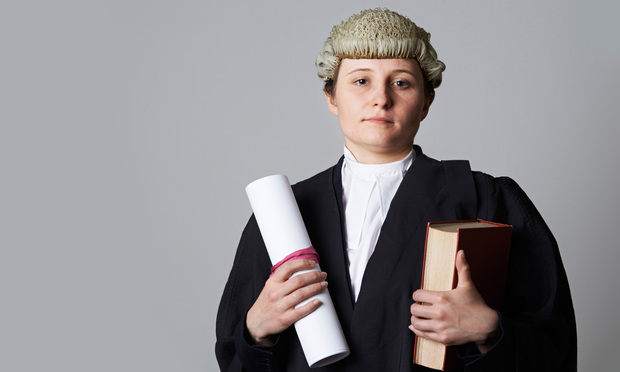It's Time to Find Out Why Female Barristers Are Not Instructed More
It is human nature to go back to familiar, tried and tested counsel, but this can mean that the same pool of barristers will always receive the briefs.
March 06, 2020 at 03:15 AM
4 minute read
 Less than one in six of QCs are women.
Less than one in six of QCs are women.
There is no shortage of talented female barristers, so the fact that only 15.8% of QCs are female is a cause for concern, particularly if this low representation could be due to female barristers not being instructed on the types of cases required to further their careers and to seek promotion to silk.
Inequitable briefing is seen as one of the most pressing practice issues for the Bar. Recently, the national Employment Lawyers Association (ELA) launched a membership-wide equitable briefing project, as it looks to play its part in raising awareness of the need for equitable briefing of barristers – that is, affording equal opportunities for male and female employment barristers to be put forward for, and instructed in employment litigation cases. Through its Counsel Instructions Monitoring Scheme, ELA hopes to raise awareness of the barriers to career progression which female employment barristers face, in order to help both sides of the profession to work towards a solution.
Those obstacles arise for a multiplicity of reasons, as is the case with all 'glass ceilings' in the workplace. ELA's scheme is concerned with the point at which solicitors select barristers for a case, and to try to understand whether there may be unconscious bias in the way briefs are allocated. It is human nature to go back to the familiar, tried and tested counsel who won the last case for a client and it can be difficult to recommend barristers to clients when solicitors have not worked with them previously. But this can mean that the same pool of barristers will always receive the briefs, resulting in serious inequality of opportunity.
If female barristers are not given the cases that will help them further their careers – they will never get the right kind of experience to enable them to apply for silk. A lack of diversity at the senior end of the Bar in turn leads to a lack of diversity in our country's judiciary, which recruits mainly from the Bar.
The issue of equitable briefing has been gaining traction over the last 18 months. In 2018, two judges in the Employment Appeal Tribunal (EAT), Mrs Justice Jennifer Eady and Lady Justice Simler (then President of the EAT), first raised serious concerns at the relatively small number of female barristers applying for silk. This was despite the employment Bar being full of immensely talented, ambitious and assertive women. The press gave wide coverage to the issue.
ELA took up the baton by running a pilot of its current scheme in 2019. Whilst the data set of that pilot was too small to draw conclusions from, it seemed that the gender of the instructing solicitor may have a bearing on the gender of counsel chosen. This prompted ELA to roll the scheme out at the beginning of 2020 to all firms and organisations who instruct employment counsel and who are represented amongst its 6,000 members.
It is often the case that the simple act of recording decisions can make people more aware of equality issues and question the basis for those decisions. ELA believes that this project could, in itself, lead to change within the profession.
ELA's scheme has been welcomed by the Employment Law Bar Association (ELBA), and the Institute of Barristers' Clerks (IBC) who are helping to support it.
ELA reports real enthusiasm and a very good take-up for the scheme amongst its members. As a membership organisation ELA believes it is uniquely placed to collect a much wider data set than individual firms would be able to do.
There is still time for more employment firms and teams to join the ELA scheme. The more data the scheme is able to collect, the better informed ELA and the legal community will be and the better placed to make recommendations to challenge the systemic and structural reasons for inequitable briefing. Without robust data there is no evidential basis on which to challenge practices which may be limiting the progression of talented members of the legal profession.
ELA aims to report on its findings in May 2020. To find out how to join the ELA Counsel Instructions Monitoring Scheme please contact [email protected]
Marian Bloodworth is deputy chair of the Employment Lawyers Association and an employment partner at Kemp Little. Claire McCann is an employment, equality and human rights barrister at Cloisters Chambers and a member of ELA's management committee.
This content has been archived. It is available through our partners, LexisNexis® and Bloomberg Law.
To view this content, please continue to their sites.
Not a Lexis Subscriber?
Subscribe Now
Not a Bloomberg Law Subscriber?
Subscribe Now
NOT FOR REPRINT
© 2025 ALM Global, LLC, All Rights Reserved. Request academic re-use from www.copyright.com. All other uses, submit a request to [email protected]. For more information visit Asset & Logo Licensing.
You Might Like
View All

Pallas Partners Founder On the Disputes Trends to Look Out For in 2025
4 minute read
What to Expect From Teresa Ribera, the EU‘s New Competition Commissioner
6 minute readTrending Stories
- 1Gunderson Dettmer Opens Atlanta Office With 3 Partners From Morris Manning
- 2Decision of the Day: Court Holds Accident with Post Driver Was 'Bizarre Occurrence,' Dismisses Action Brought Under Labor Law §240
- 3Judge Recommends Disbarment for Attorney Who Plotted to Hack Judge's Email, Phone
- 4Two Wilkinson Stekloff Associates Among Victims of DC Plane Crash
- 5Two More Victims Alleged in New Sean Combs Sex Trafficking Indictment
Who Got The Work
J. Brugh Lower of Gibbons has entered an appearance for industrial equipment supplier Devco Corporation in a pending trademark infringement lawsuit. The suit, accusing the defendant of selling knock-off Graco products, was filed Dec. 18 in New Jersey District Court by Rivkin Radler on behalf of Graco Inc. and Graco Minnesota. The case, assigned to U.S. District Judge Zahid N. Quraishi, is 3:24-cv-11294, Graco Inc. et al v. Devco Corporation.
Who Got The Work
Rebecca Maller-Stein and Kent A. Yalowitz of Arnold & Porter Kaye Scholer have entered their appearances for Hanaco Venture Capital and its executives, Lior Prosor and David Frankel, in a pending securities lawsuit. The action, filed on Dec. 24 in New York Southern District Court by Zell, Aron & Co. on behalf of Goldeneye Advisors, accuses the defendants of negligently and fraudulently managing the plaintiff's $1 million investment. The case, assigned to U.S. District Judge Vernon S. Broderick, is 1:24-cv-09918, Goldeneye Advisors, LLC v. Hanaco Venture Capital, Ltd. et al.
Who Got The Work
Attorneys from A&O Shearman has stepped in as defense counsel for Toronto-Dominion Bank and other defendants in a pending securities class action. The suit, filed Dec. 11 in New York Southern District Court by Bleichmar Fonti & Auld, accuses the defendants of concealing the bank's 'pervasive' deficiencies in regards to its compliance with the Bank Secrecy Act and the quality of its anti-money laundering controls. The case, assigned to U.S. District Judge Arun Subramanian, is 1:24-cv-09445, Gonzalez v. The Toronto-Dominion Bank et al.
Who Got The Work
Crown Castle International, a Pennsylvania company providing shared communications infrastructure, has turned to Luke D. Wolf of Gordon Rees Scully Mansukhani to fend off a pending breach-of-contract lawsuit. The court action, filed Nov. 25 in Michigan Eastern District Court by Hooper Hathaway PC on behalf of The Town Residences LLC, accuses Crown Castle of failing to transfer approximately $30,000 in utility payments from T-Mobile in breach of a roof-top lease and assignment agreement. The case, assigned to U.S. District Judge Susan K. Declercq, is 2:24-cv-13131, The Town Residences LLC v. T-Mobile US, Inc. et al.
Who Got The Work
Wilfred P. Coronato and Daniel M. Schwartz of McCarter & English have stepped in as defense counsel to Electrolux Home Products Inc. in a pending product liability lawsuit. The court action, filed Nov. 26 in New York Eastern District Court by Poulos Lopiccolo PC and Nagel Rice LLP on behalf of David Stern, alleges that the defendant's refrigerators’ drawers and shelving repeatedly break and fall apart within months after purchase. The case, assigned to U.S. District Judge Joan M. Azrack, is 2:24-cv-08204, Stern v. Electrolux Home Products, Inc.
Featured Firms
Law Offices of Gary Martin Hays & Associates, P.C.
(470) 294-1674
Law Offices of Mark E. Salomone
(857) 444-6468
Smith & Hassler
(713) 739-1250









